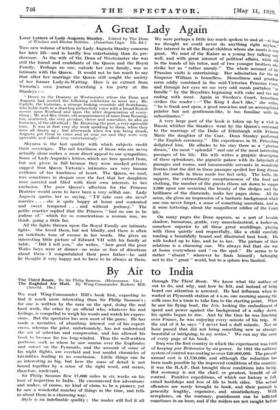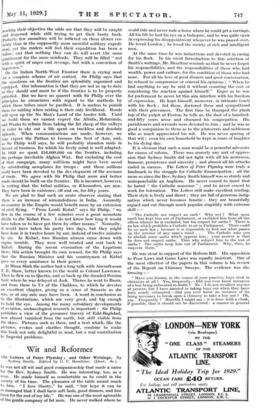By Air to India
The Third Route. By Sir Philip Sassoon. (Heinemann. 15s.) The Baghdad Air Mail. By Wing-Commander Roderic Hill. (Arnold. 18s.)
WE read Wing-Commander Hill's book first, expecting to find it much more interesting than Sir Philip Sassoon's ; for one is written by the man on the spot, doing the real hard work, the other by an official who, whatever his real feelings, is compelled to weigh his words and watch his expres- sions. But the spectator has seen most of the game. He has made a narrative of absorbing interest out of his experi- ences, whereas the pilot, unfortunately, has not understood the art of selection and compression, and has allowed his book to become far too long-winded. Thus the well-written portions, such as where he saw sunrise over the Euphrates and sunset on the Pyramids, and the account of some of his night flights, are overlaid and lost amidst chronicles of trivialities leading to no conclusion. Little things can be as interesting as big, but here the mass of detail is not bound together by a sense of the right word, and seems, therefore, irrelevant.
Sir Philip Sassoon flew 17,000 miles in six weeks on his tour of inspection to India. He encountered few adventures and makes, of course, no kind of claim to be a pioneer, yet he saw a wonderful number of things in the time, and tells us about them in a charming way.
Style is an indefinable quality : the reader will feel it all
through The Third Route. We know what the author set out to do, and why, and how he felt, and instead of being bored our attention is arrested. He had influenza when he waited at Plymouth station at 4 a.m. one morning among the milk cans for a train to take him to the starting point. When he saw his flying boat, the Iris, looking the embodiment of speed and power against the background of a sulky dawn, his spirits began to rise. And by the time he was lunching over France, he was enjoying every minute of his trip. At the end of it he says " I never had a dull minute. Not an hour passed that did not bring something new or strange, beautiful or intriguing, to my notice." We can say the same of every page of his book.
Iraq was the first country in which the experiment was tried of keeping pax Britannica by air power. In 1921 the military system of control was costing us over £20,000,000. The present annual cost is £1,750,000, and although the reduction has been made possible by the improved conditions of the country, it was the R.A.F. that brought these conditions into being. But economy is not the chief, or greatest, benefit of air control. Punitive expeditions, of which our history is full, entail hardships and loss of life to both sides. The actual offenders are rarely brought to book, and their pursuit is generally lengthy, expensive, and unsatisfactory. With aeroplanes, on the contrary, punishment can be inflicted sometimes in an hour, and if the raiders are not caught before reaching their objective the odds are that they will be caught Bud dispersed while still trying to get their booty back. probably few casualties will be inflicted on them (fewer cer- tainly than in the supposedly more merciful military expedi- tion), yet the raiders will feel their expedition has been a failure, and that nothing they can do will avert the mine punishment for the same misdeeds. They will be filled " not with a spirit of anger and revenge, but with a conviction of Impotence." On the Indian North-West Frontier there is crying need for a complete scheme of air control. Sir Philip says that the squadrons on the frontier are splendidly organized and equipped. Our information is that they are not as up to date as they should and must be if the frontier is to be properly patrolled. But we have no quarrel with Sir Philip over the principles he enunciates with regard to the methods by which these tribes must be pacified. It is useless to punish them for raiding when raiding is their only livelihood. Roads will open up the No Man's Land of the border folk. Until we build them we cannot expect the Afridis, Mohmunds, and Wazirs to refrain from taking the fat sheep of the valleys in order to eke out a life spent on trackless and desolate uplands. When communications are made, however, we may expect the Pathan to become the Scot of Asia, and, as Sir Philip well says, he will probably abandon raids in favour of business, for which his lively mind is well adapted. In 1920 we spent £16,000,000 on the frontier, including the perhaps inevitable Afghan War. But excluding the cost of that campaign, many mil lions might have been saved by substituting aeroplanes for troops : and those millions could have been devoted to the development of the avenues of trade. We agree with Sir Philip that more and better roads should be built on the frontier. He is incorrect, however, 1 in writing that the tribal militias, or Khassadars, are new. They have been in existence, off and on, for fifty years.
We are glad to find such an acute observer stating that there is an increase of airmindedness in India. Assuredly no country in the Empire would benefit more by an extension of civil flying. " From Landi Kotal," says Sir Philip, " we flew in the course of a few minutes over a great mountain divide to the Kohat Pass. I do not know how long it would have taken us to have got there by other means." Normally, it would have taken his party two days, but they might have done it in twelve hours by car, instead of twelve minutes by air. In Kohat, two Russian airmen came down with engine trouble. They were well treated and sent back to Kabul. During the recent evacuation of the Legations there, this action brought its own reward, for Sir Philip says that the Russian Minister and his countrymen at Kabul gave us every assistance in their power.
At Miran Shah the author had a long talk with Aircraftsman T. E. Shaw, better known to the world as Colonel Lawrence. Then he flew on to Quetta, and so back up the dreaded Persian Gulf where he was delayed at Jask. Thence he went to Basra, and from there to Ur of the Chaldees, to which he devotes an excellent chapter, giving us a sense of Sumeria as she was, or at any rate may have been. A word in conclusion as to the illustrations, which are very good, and big enough to hold the eye. Among the many subsidiary developments of aviation, archaeological research is important : Sir Philip publishes a view of the gossamer tracery of Eski-Baghdad, now almost vanished from the earth, but still visible from the skies. Pictures such as these, and a text which, like the pictures, evokes and clarifies thought, combine to make this book not only delightful to read, but a real contribution to Imperial problems.











































 Previous page
Previous page